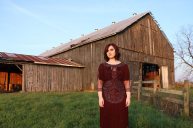It's a scorching hot afternoon in Nashville and JP Harris is home on a lunch break. He's spent the day building a new deck for fellow East Nashville resident JD McPherson. The carpenter-by-day, honky-tonker-by-night embodies the ethos put forth in Waylon Jennings' timeless "Are You Sure Hank Done it This Way?," carrying on a way of life that values quality songs and hard work over new, shiny cars -- or jacked up trucks, as the case may be.
Videos by Wide Open Country
"I sort of became an old man by the time I was 23," Harris tells Wide Open Country. "I wanted to represent a good, hardworking ethic and it kind of stuck with me forever."
Harris, who refers to himself as a carpenter who writes country songs, strikes a balance between road warrior and homebody.
"I'm not just your average lazy guitar player guy," Harris jokes. "Lord knows I wish I didn't work as much as I did when I'm not playing music, but at the same time being a carpenter has always leveled out the two worlds for me. There's this side of me that loves nothing more than hitting a new town every night and having a new adventure every day," Harris says. "At the same time, months and months of that starts to wear on me. When I'm home, I'm a very domestic guy. I'm in bed early and I'm up with the chickens. I like to get up early and clean my kitchen and make coffee. I like mowing my grass. One side is this swirling ball of exciting chaos and flame and the other side is this very well contained sphere of a normal, predictable life. I think it just levels me out."
On his new album Sometimes Dogs Bark at Nothing (out on Oct. 5 on Free Dirt Records), produced by Old Crow Medicine Show's Morgan Jahnig, Harris explores inner demons, vices and the dark side of the music industry.
Harris left home in the eighth grade when he hopped a Greyhound bus in the middle on the night. He joined up with the DIY punk scene, but fell in love with country music when a friend brought home a Statler Brothers record from a flea market. Harris quickly realized that the music of Jimmie Rodgers and The Carter Family reflected the life he was living.
"It kind of synced up. I was riding freight trains all over and hitchhiking. None of those stories were reflected in what I had been listening to," Harris says. "As I started spending time in rural places and I started traveling on foot a lot more, all those stories in country music started to make more sense to me."
Harris immersed himself in old time music, traveling to fiddling conventions across the country. His appreciation for preserving traditions meshed with the historic carpentry work he was doing while living in Vermont.
On Sometimes Dogs Bark at Nothing, Harris draws on a wide range of country music influences. He gives a nod to his own rambling ways and Jimmie Rodgers' singing brakeman persona on "Jimmy's Dead and Gone" and recalls the rowdiest Waylon-era in the rollicking ode to a weekend bender "JP's Florida Blues #1."
"Lady in the Spotlight" turns the lens on sexism and sexual harassment in the music industry.
"One day you may be the lady in the spotlight, but tonight you're just some cold heart's passing flame," Harris sings. "Oh I pray that one day you'll face the spotlights, but tonight you're just a girl with no last name."
Harris says the song was inspired by stories he's heard from women musicians.
"There are still so many women that go chasing after this dream of becoming a musician and they believe that their talent and their heart being in the right place is enough to get them there. And it should be," Harris says. "Instead, when they finally get in on the ground floor they find that they're just surrounded by a bunch of wolves--a bunch of men who are only going to open those doors for them if they compromise their own integrity. I just think that it's a sad state of affairs to see."
"Myself, as a man, I have a lot to work on -- deconstructing the things that I grew up being influenced by and what society has taught me in the way that I relate to women, too," Harris continues. "I've always tried to make a real conscious and concerted effort about that, but in general I think 90 percent of the men in the music industry -- despite the dialogue and the informed perspective that they all should be able to have through how much has been out in the media about the unfair state of the music industry for women -- I think most men just tend to write if off."
"When I Quit Drinking" delves into the realities of addiction over a country shuffle, while standout track "Runaway" a slow burning analyzation of Harris' own train-hopping troubadour ways.
Like much of his carpentry work, on Some Dogs Bark at Nothing, Harris builds something new while preserving the traditional.
"I believe there's a balance that can be struck in furthering each type of American music. It can be preserved and respected in its traditional forms and then the envelope also needs to be pushed a little bit. Because the world continues to change and some of the ideas and realities in day to day life have all changed very drastically in the last 100 years from when country music began. The sounds of country music have changed," Harris says. "In my own way, I want to further traditional country music and keep expanding it."
Harris will play an album release show on Oct. 5 at The Basement East. For a full list of tour dates, visit his official website.
Now Watch: 10 Things You Didn't Know About George Strait
https://rumble.com/embed/u7gve.v3v7u5/




